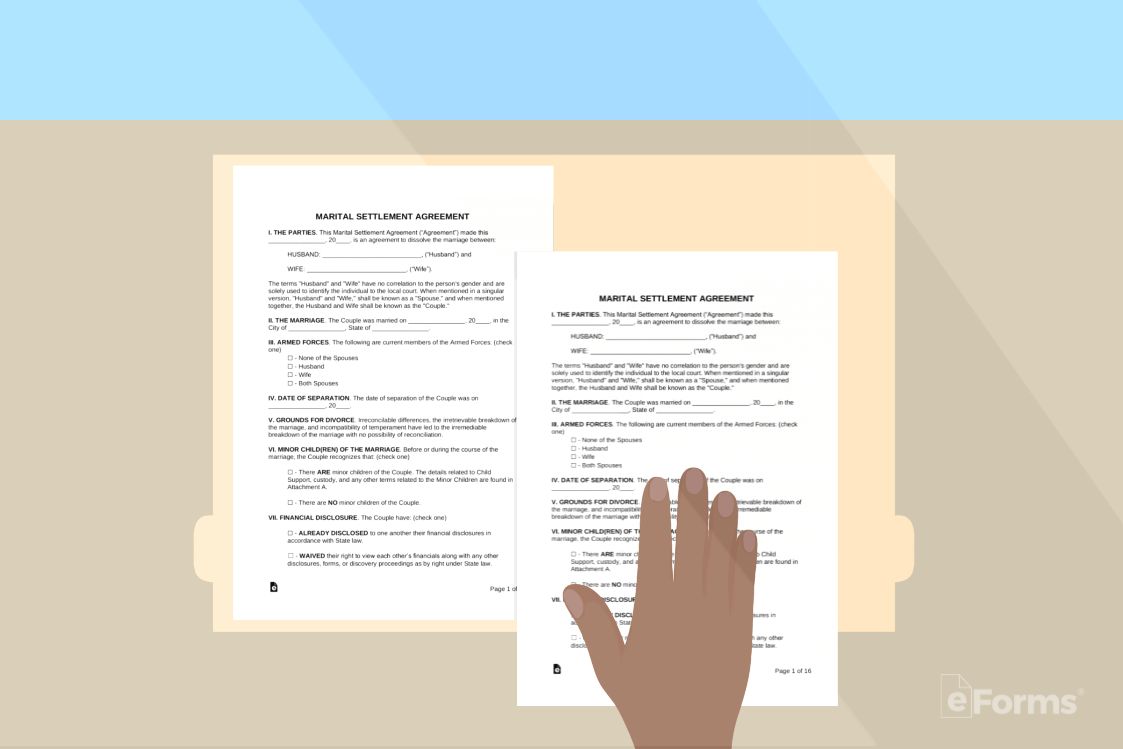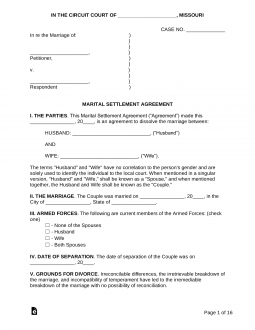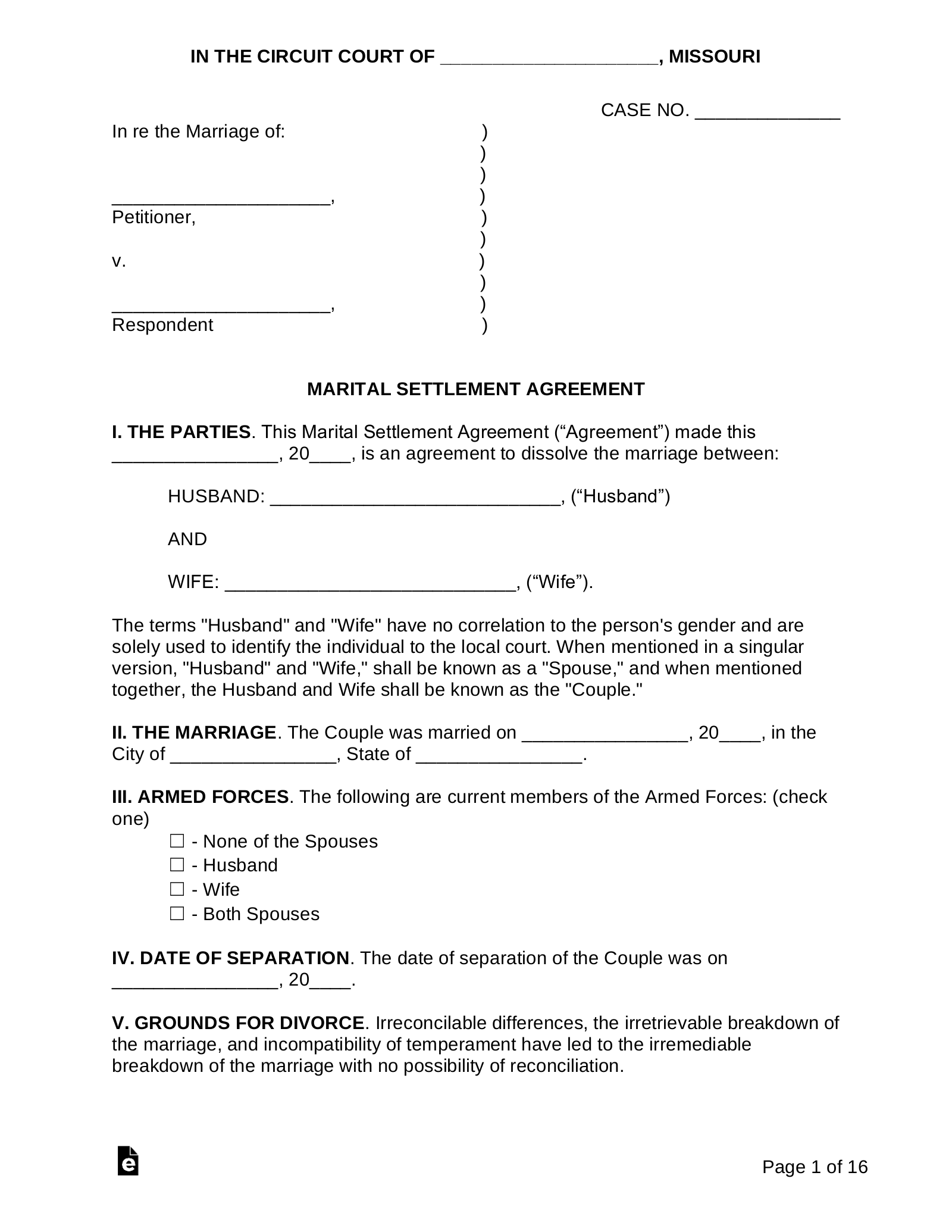Updated November 28, 2023
A Missouri marital settlement agreement is a document that a married couple signs to set out the terms of their divorce in a legally binding contract. By entering into an agreement, the couple is able to negotiate how their property and custody of their children will be divided without court intervention. If one (1) party requests alimony and/or child support, the contract must include these terms as well. When a couple is in disagreement regarding their divorce, divorce proceedings are prolonged and much more costly than in an uncontested case. Therefore, it is recommended that couples execute an agreement before their divorce is finalized, ideally with legal consultation.
Table of Contents |
Divorce Laws
Alimony (§ 452.080 and § 452.335) – In Missouri, alimony is legally termed “maintenance” and is awarded in gross (lump sum) or from year to year (periodic). Maintenance is awarded based on the following
- The financial standing of each spouse
- The ability of the alimony-seeking spouse to support themselves
- The established standard of living during the marriage
- The length of their marriage
- The educational needs of the party seeking maintenance
- The comparative earning capacity of each spouse
- The age and the condition of the spouse seeking maintenance
- The ability of the spouse from whom maintenance is sought to meet his needs while meeting those of the spouse seeking maintenance;
- The conduct of each party during the marriage
- Any other factors that the court deems relevant
Alimony Calculator – calculators.law
Child Support (§ 452.340) – Either or both spouses can be ordered to pay child support to the other party as determined by the court. The amount and schedule of support to be paid will be established in consideration of the financial needs and resources of the children and spouses, the standard of living established during the marriage, the children’s educational needs, the division of child custody, and child care expenses.
Child Support Calculator – divorcehq.com, freeform14.com
Division of Property (§ 452.330) – Missouri is an equitable distribution state, which means that the property is divided between the couple in what the court determines to be the fairest, though not necessarily “equal,” distribution.
Grounds for Divorce (§ 452.305(1) and § 452.320) – Spouses can file for divorce on the “no-fault” grounds of declaring that their marriage is irretrievably broken. If the other spouse denies that their marriage is broken, or to obtain a fault-based divorce, the petitioner can file a case based on one (1) or more of the following grounds:
- Adultery
- Unreasonable behavior
- Six (6) months’ abandonment
- Twelve (12) months’ separation by mutual consent
- Twenty-four (24) months’ separation
Interim Support (§ 452.335) – Upon the submission of a motion, the court may award temporary alimony to be paid to one (1) spouse while their divorce case is ongoing.
Residency (§ 452.305(1)(1)) – One (1) of the spouses must have been a resident of Missouri for at least ninety (90) days immediately prior to filing their case.
Divorce Forms
- Where to File – Circuit Court in County of Residence
- Filing Fee – At least $150
- How Long Does it Take? At least thirty (30) days
Uncontested Divorce with No Children:
- Petition for Dissolution of Marriage (CAFC001)
- Certificate of Dissolution of Marriage
- Statement of Income and Expenses (CAFC050)
- Statement of Property and Debt and Proposed Separation Agreement (CAFC040) (Instructions)
- Respondent’s Answer to Petition for Dissolution of Marriage (CAFC010-R)
- Judgment and Decree of Dissolution of Marriage (CAFC070)
- Filing Information Sheet
- Notice of Hearing (CAFC721)
- Summons (served by the court)
- Respondent’s Answer to Petition for Dissolution of Marriage (CAFC010-R)
- In Forma Pauperis Application
- Entry of Appearance and Waiver of Service
Uncontested Divorce With Children:
- Petition for Dissolution of Marriage (CAFC001)
- Certificate of Dissolution of Marriage
- Statement of Income and Expenses (CAFC050)
- Statement of Property and Debt and Proposed Separation Agreement (CAFC040) (Instructions)
- Respondent’s Answer to Petition for Dissolution of Marriage (CAFC010-R)
- Judgment and Decree of Dissolution of Marriage (CAFC070)
- Filing Information Sheet
- Parenting Plan (CAFC501) (Instructions)
- Notice of Hearing (CAFC721)
- Summons (served by the court)
- Respondent’s Answer to Petition for Dissolution of Marriage (CAFC010-R)
- In Forma Pauperis Application
- Entry of Appearance and Waiver of Service
How to File for Divorce in Missouri (7 steps)
- Complete and File Divorce Paperwork
- Serve Respondent
- Respondent’s Answer
- Marital Settlement Agreement and Proposed Separation Agreement
- Notice of Hearing
- Final Hearing, Judgment, and Decree of Dissolution of Marriage
- Name Change
1. Complete and File Divorce Paperwork

To obtain a divorce in Missouri (the legal term is “dissolution of marriage”), one (1) spouse, referred to as the “petitioner,” will need to complete and file a Petition for Dissolution of Marriage with the Circuit Court for the county in which they or their spouse (the “respondent”) reside. In addition to the petition, the below forms must be completed and filed by the petitioner to begin legal action for divorce.
Additional forms may be required depending on the count, and the petitioner should verify if extra documentation is needed by contacting the court clerk’s office in advance.
- Certificate of Dissolution of Marriage
- Statement of Income and Expenses
- Statement of Property and Debt and Proposed Separation Agreement (Instructions)
- Respondent’s Answer to Petition for Dissolution of Marriage
- Judgment and Decree of Dissolution of Marriage
- Filing Information Sheet
- Parenting Plan (Instructions) – Couples with children only
The court clerk will charge the petitioner a filing fee of at least $150 that must be paid at the time of the filing. This fee may be waived if an In Forma Pauperis Application is completed and filed with the petition.
2. Serve Respondent
When the petition is filed, the clerk of the court will charge an additional fee to have the respondent served by the local sheriff’s office or a professional process server. The court will issue a Summons that the server will deliver to the respondent along with a copy of the petition. Alternatively, the respondent can complete and file an Entry of Appearance and Waiver of Service to waive the service requirement.
3. Respondent’s Answer
Upon receiving the summons and petition, the respondent will have the opportunity to file an Answer to Petition for Dissolution of Marriage, a copy of which they must deliver to the petitioner by hand, first-class mail, e-mail, or fax. The respondent will also need to complete and file a Statement of Income and Expenses and, if they have children, a Parenting Plan with the circuit court where the case was filed. In an uncontested divorce, the respondent must agree with all of their spouse’s claims made in the petition.
4. Marital Settlement Agreement and Proposed Separation Agreement

Before the case can proceed to a final hearing, the respondent must sign the Proposed Separation Agreement and file it with the court clerk. To assist the couple in coming to a mutually favorable arrangement, a Marital Settlement Agreement may be drafted, ideally with the mediation of legal professionals. The signatures of both spouses on the Proposed Separation Agreement must be notarized.
5. Notice of Hearing
Once both spouses have executed and filed all of the necessary forms, the court will set a date for the final hearing no less than thirty (30) days from the date that the case was filed. A Notice of Hearing will be given to the petitioner who must deliver a copy of the document to the respondent by hand, first-class mail, e-mail, or fax.
6. Final Hearing, Judgment, and Decree of Dissolution of Marriage

At the final hearing, the judge will review the couple’s Proposed Separation Agreement and, if everything is in order, will finalize the divorce by signing the Judgment, and Decree of Dissolution of Marriage. Certified copies of the judgment can be obtained by both spouses to update their accounts and records.
7. Name Change
Either spouse in a divorce can legally revert to a previous name by including a name change request in their divorce petition. To adopt a new name or to change their name after their divorce is final, individuals will need to file a Petition for Change of Name with their local circuit court.


